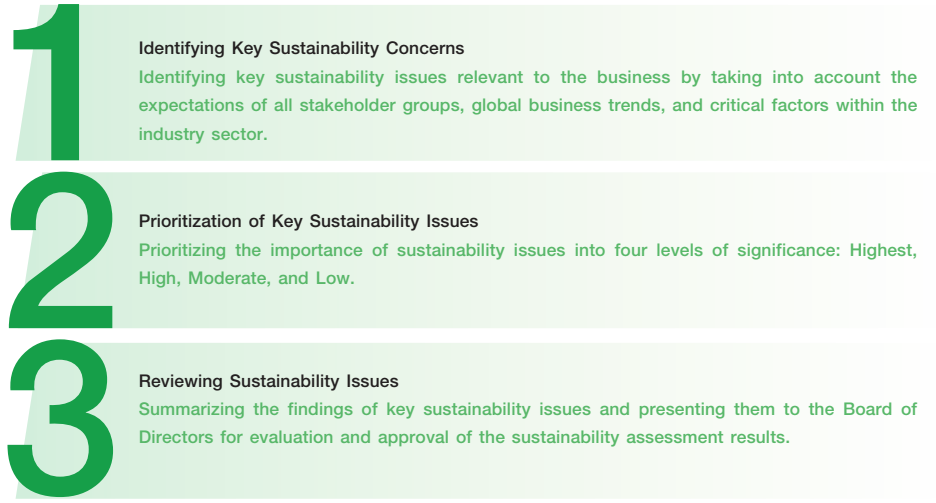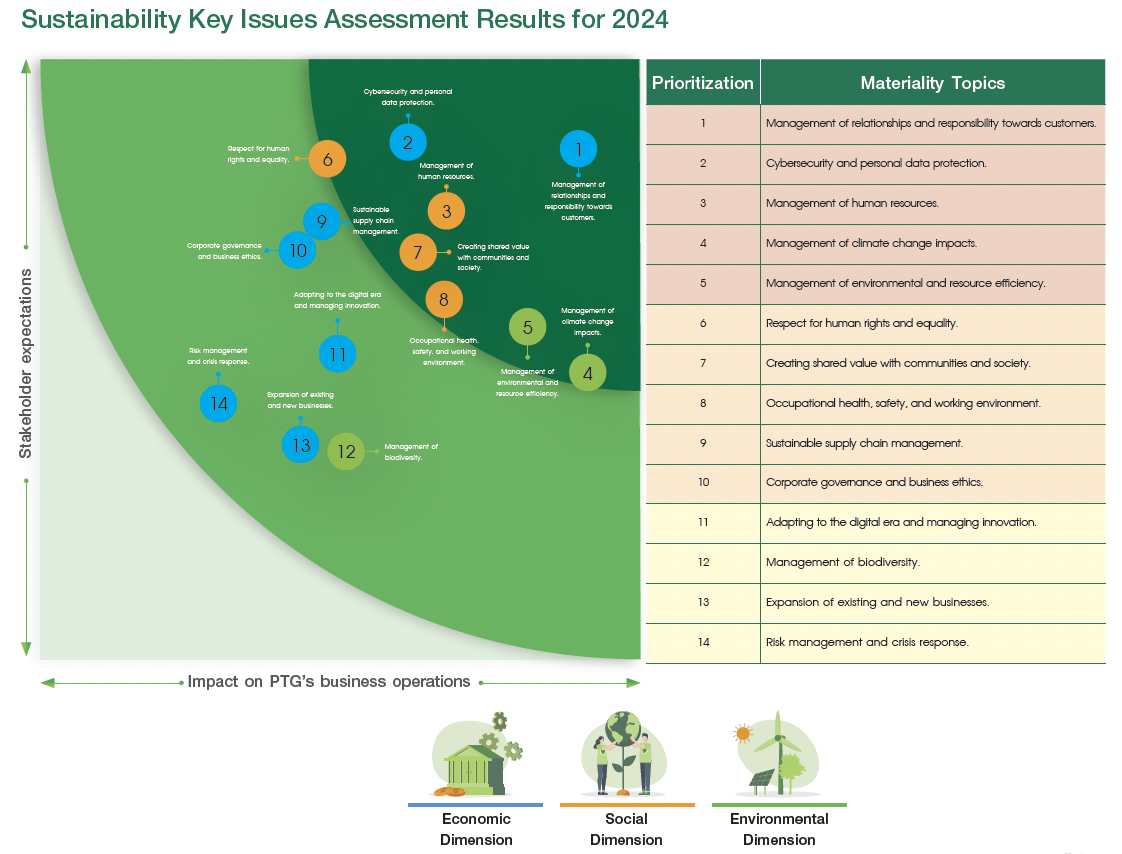Materiality Assessment

In 2024, the Company reviewed its material sustainability issues by studying business trends, environmental and social challenges, human rights, and corporate governance aspects, as well as the key issues of companies within the same industry. The review identified the top five issues of highest concern among stakeholders as follows: 1. Customer relationship management and responsibility 2. Cybersecurity and personal data protection 3. Human resource management 4. Climate change management 5. Efficient environmental and resource management. The material issues were taken into company risk identification process , as supplementary inputs, together with the potential changes for both external and internal factors for identifying corporate risks. Moreover, the key material issues were also used for cross-checking the significant corporate risks with the linkage as shown in the below table.
| KEY MATERIAL ISSUE |
RISK AREA |
LINKAGE TO CORPORATE RISK |
|
Management issues, relationships, and responsibilities to customers
|
Strategic Risk |
• Risk of oil shortages in meeting customer demand
• Risks that may affect the organization's credibility and reputation |
|
Cybersecurity
issues and personal data protection
|
Operational Risks
|
• Cybersecurity risks
• Risks from adapting to emerging technologies • Risks from non-compliance with laws, regulations, rules, and policies related to business operations |
|
Human resource management issues
|
Operational Risks
|
• Risks
from inadequate human resource management in response to organizational growth
|
Materiality Assessment Results

Key Indicator and Performance
| Materiality Issues | Potential Business Impacts/Business Impacts | Causes of Impacts | Human Rights Impacts |
|---|---|---|---|
| Good Corporate Governance | |||
| Good Corporate Governance GRI 102: Governance GRI 205: Anti-corruption |
• Driven by institutional and investor expectations, the Company recognizes the criticality of effectively managing corporate governance factors. This involves conducting surveys on corporate governance among listed companies. The evaluation outcomes significantly impact the Company's reputation and potential revenue, as trust from stakeholders is imperative for sustained success. Failure to address governance issues property can lead to loss of trust. | • operations • Suppiy Chain |
6 , 8, 9,19, 24, 25, 27, 33 |
| Risk and Crisis Management GRI 102: Governance |
• Ongoing changes in economic, social, environmental, legal, technological, and health-related landscapes necessitate continual adjustments to business plans. These adaptations are vital to preempt potential disruptions to business operations. | • Products/Services • Suppiy Chain |
- |
| Cybersecurity | •Transitioning the business to an online trading platform via applications, e-wallet payment systems, and PT Max Card membership services introduces vulnerabilities to cyber threats and data breaches. Such risks can adversely affect customers and inflict damage on the Company's operations. | • Operations • Products/Services • Suppiy Chain |
11 |
| Inspire and enable value-added experience throughout the supply chain | |||
| Business Expansion and Continual Growth in Performance GRI 201: Economic Performance |
• The Company is navigating the effects of heightened fluctuations in global energy prices, prompting govermental measures to freeze oil prices. Consequently, a strategic shift is imperative to ensure sustained growth amidst these market dynamics. | • Operations • Products/Services |
- |
| Business and Social Innovations | • Embracing opportunities to invest in innovative services and products is pivotal for long-term revenue growth. This proactive approach enables the Company to address evolving customer needs in the new normal while mitigating risks associated with disruptive technologies. | • Operations • Products/Services |
19 |
| Customer Relations and Responsibility Management GRI 416: Customer Health and Safety GRI 418: Customer Privacy |
• Evolving consumer behaviors influenced by economic, social, and environmental factors necessitate strategic adjustments to the Company's operational plans. This ensures the ability to cater to diverse customer needs comprehensively. • Compliance with the personal data protection law mandates substantial adjustments to the Company's information technology infrastructure. Stringent measures are being implemented to mitigate the risk of customer personal information leakage. |
• Products/Services • Suppiy Chain |
- |
| Supply Chain Management GRI 204: Procurement Practice 2016 |
• Establishing guidelines for human rights risk management is crucial to prevent incidents of human rights violations across all stakeholder groups. Failure to address these issues adequately could severely impact the Company's reputation and necessitate budget allocations for compensation. | • Operations • Products/Services • Suppiy Chain |
- |
| Transform the organization towards excellence | |||
|
Human Resources Management GRI 401: Employment GRI 404: Training and Education |
• Risks associated with manpower preparation and employee capacity to support new business endeavors and digital transformation underscore the importance of effective management. Inadequate management may jeopardize the organization's competitiveness. | • Operations • Products/Services |
23, 25, 29 |
|
Occupational Safety and Work Environment GRI 403: Occupational Health and Safety |
• Potential work-related accidents involving employees and contractors pose a significant risk, potentially halting operations, tamishing the Company's reputation, and necessitating budget allocations for compensation. | • Operations • Products/Services • Suppiy Chain |
1, 25, 27, 28 |
|
Human Rights GRI 405: Diversity and Equal Opportunity GRI 409: Forced or Compulsory Labor 2016 |
• Establishing guidelines for human rights risk management is crucial to prevent incidents of human rights violations across all stakeholder groups. Failure to address these issues adequately could severely impact the Company's reputation and necessitate budget allocations for compensation. |
• Operations • Products/Services • Suppiy Chain |
- |
| Engage and Co-create value with society and environment | |||
|
Social and Community Responsibility GRI 203: Indirect Economic Performance GRI 413: Local Communities |
• Community grievances arising from the company's business operations pose another risk. To mitigate this, the Company actively engages in ongoing social activities within the community. • Opportunities arise for forging partnerships with the community to advance commercial objectives under the vision of "Well-being and Contentedness. |
• 5 CSR project implemented • There were 311 volunteers joined the CSR activities • Community satisfaction rate = 94.63% |
1, 23, 25, 28, 34 |
|
Climate Change Management GRI 305: Emission |
• Increasing physical risks and global initiatives promoting the transition to a low-carbon society. both nationally and internationally, are reshaping the energy landscape. This shift entails reduced dependence on fossil fuels and an uptick in electric vehicle and electric train usage. Failure to adapt to these changes may impact the Company's operational outcomes. | • Operations • Products/Services • Suppiy Chain |
1. 23 |
|
Environmental, Waste, and Pollution Management GRI 306: Waste GRI 307: Environmental Compliance Energy Saving GRI 302: Energy Water Management GRI 303: Water and Effluent |
• Heightened awareness of circular economy principles, spurred by public and private sector campaigns. underscores the imperative of optimizing natural resource utilization to mitigate degradation and forestall future scarcities. These considerations necessitate cost adjustments and strategic planning for sustained business growth. • The evolving landscape presents an opportunity for collaborative partnerships with business allies to realign operational |
• Operations • Products/Services • Suppiy Chain |
31 |





